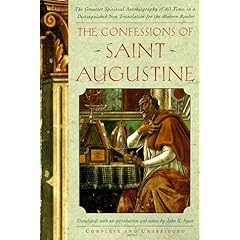The Confessions of St. Augustine
 I haven't read all of it, and I'm not sure I will at the moment, but I would like to throw some ideas about it on the blog.
I haven't read all of it, and I'm not sure I will at the moment, but I would like to throw some ideas about it on the blog.I read Books X-XII, partly on a friend's suggestion, and partly because of this curious list. Book X is terribly interesting in its exploration of memory and its deep humanism (despite the intermittent comments to God reminding the reader and Augustine that He is the intended audience, it seems). The passage on sacred music (X.33) is especially wonderful, mostly because it so greatly takes for granted the notion that a human creation (music) is a grave threat to God's power over us, that human beauty can overwhelm sacred beauty. Augustine probably wouldn't endorse that paraphrase, but I believe it is close to what he fears.
Book XI is fascinating mainly for its exploration of time, particularly in the way it differentiates past, present, and future. It's also perhaps the most fun hair-splitting has been since Aristotle.
Book XII, however, is the one I'd like to return to for the way it treats silence and speaking. Augustine is perplexed by the mechanics of God's speech which calls the world into being (this carries over from Book XI). In defining darkness as the absence of light, Augustine also states that, "the presence of silence simply means the absence of sound." This is a common Augustinian move—defining something as the privation or absence of something else, yet there is, I feel, also in his writing a sense that resists this simple dualism of presence and absence. Or maybe there isn't—I can't find, at the moment, a citation which would make my case.
But I think there is another way of thinking about silence which runs quite counter to Augustine's definition. It is the idea that sound can become so simple, so rarefied, so pure, that it exists as silence, that silence is sound to the zeroth degree in a sense. Another way of thinking about it is by talking about the signal-to-noise ratio. If it were possible to reduce the noise in a given communication or a given system to zero, the ratio would be undefined—silence. (Right?)
This logic is what I feel is behind the mystical traditions of apophaticism. If our communications with God can be purified to such an extent that we have eliminated all worldly distraction (noise), our signal can only be silence.
Finally, Book XII is radically interesting for its distinctions between truth and intention, and among a tripartite system of inspiration, authorship and interpretation. Truth, for Augustine, seems to be a plural thing, while intention is singular, but capacious—capable of being extended over the field of truth—when, that is, the author is inspired by the truth.
Comments